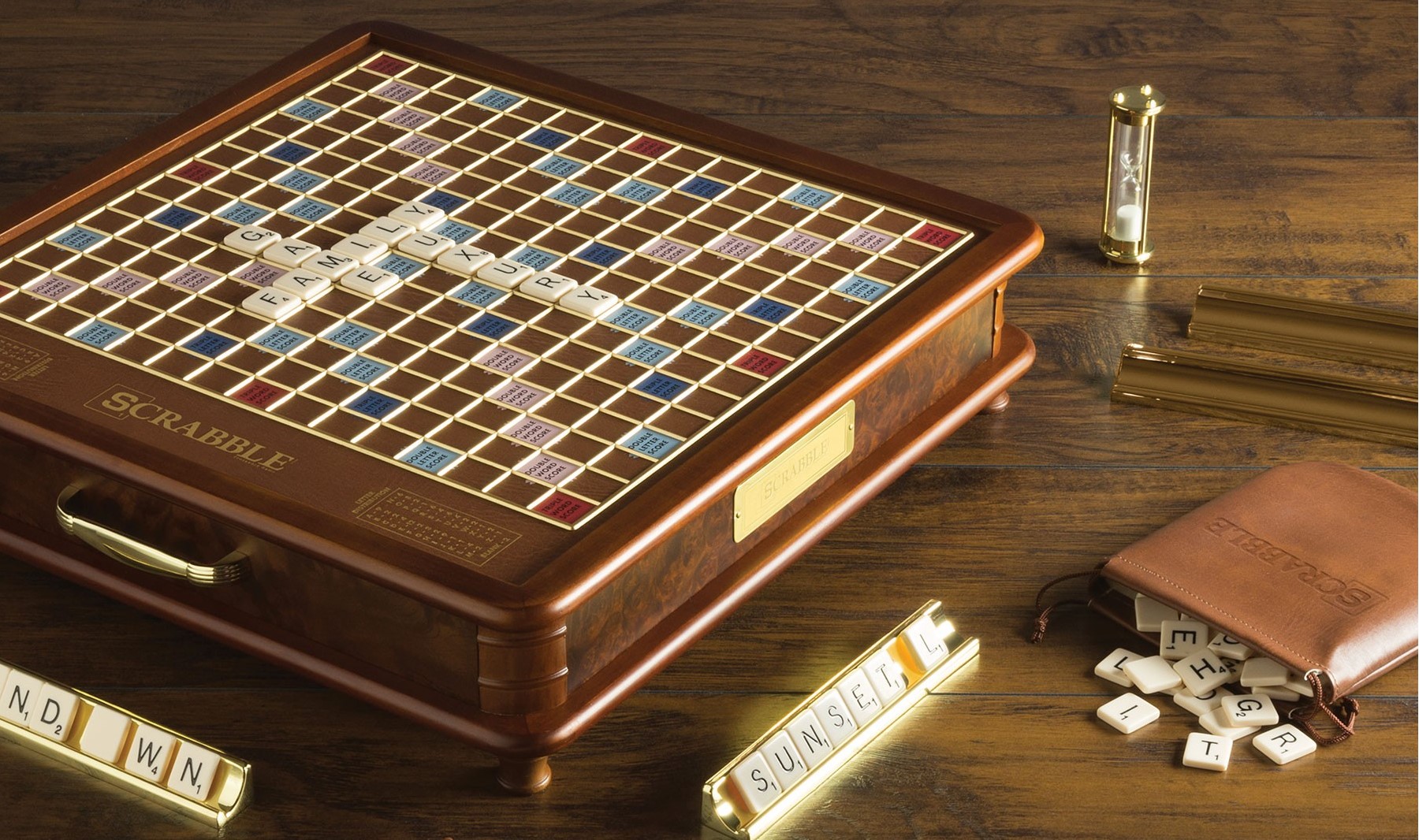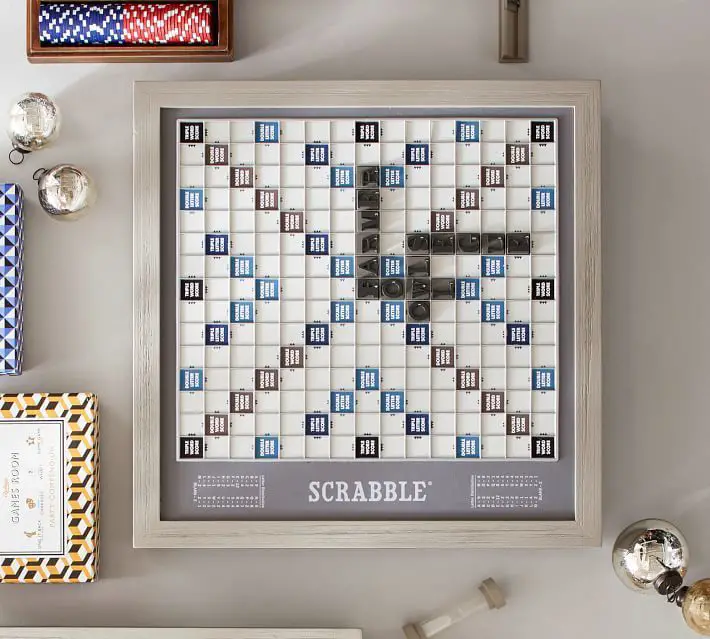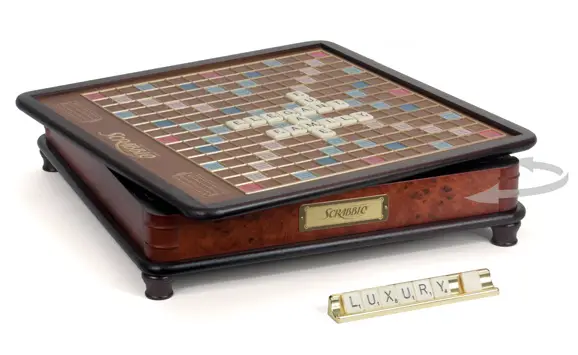
Impress your friends and family with SCRABBLE terminology. Our glossary will have you sounding like a SCRABBLE pro in no time. Just click on a letter to jump to that section of the glossary.
Abbreviations: DLS: Double Letter Score; DWS: Double Word Score; TLS: Triple Letter Score; TWS: Triple Word Score; ?: Blank; PTS.: Points.
Alphagram: The alphabetic arrangement of a group of letters. Example: BEGNU is the alphagram of the word BEGUN.
Anagram: A word that is spelled with the exact same letters as another word. Example: KITCHEN is an anagram of THICKEN, and vice versa. GAPE is an anagram of PAGE.
Balancing Your Rack: Making a play that leaves the letters on your rack which will most likely help you to score well next turn. This often means leaving a favorable ratio of vowels and consonants. Also known as Rack Balance.
Bingo: Any word played that uses all seven letters of the rack, earning a bonus of 50 points. British players use the term "bonus" instead of bingo.
Bingo-Prone Tiles: A group of tiles that are likely to produce a bingo. Often used to describe a player's set of three to six tiles just before drawing his or her replacement tiles. Example: ERS?, AL?, or AERST.
Blank: One of the two tiles that have no letter printed on them. The blank is worth zero points, but is widely regarded as the most valuable tile due to its chameleon-like ability of being able to represent any letter. Having one increases the odds of playing a bingo.
Blank Bingo: A bingo that includes a blank tile.
Blocking: The act of playing a word on the board that stops the opponent from making a potentially large score.
Braille: To feel the surface of a tile while your hand is in the bag in order to draw a blank or other specific letter. This is strictly forbidden.
"Challenge!": An opponent calls "Challenge!" when s/he thinks a word is not acceptable (i.e., not in the OSPD3). The opponent records the challenged words on a "challenge slip" and a word judge is called to verify the acceptability of all the words formed on a play. If any of the words challenged are unacceptable, the whole play is unacceptable. The player must then remove his or her play from the board and lose that turn. If all the words are acceptable, then the challenger loses his or her turn. Only one turn is lost on any challenge.
Challenge Slip: The slip of paper upon which the words being challenged are printed by one of the players (and double-checked by the opponent). These slips are generally preferred to a player's simply pointing to the challenged word on the board. That's because mistakes are much more likely to be made unless the words are recorded.
Closed Board: The opposite of an open board: when there are few or no places on the board to put down either bingos or other high-scoring plays.
Coffeehousing: To make small talk, crack knuckles, or do any of a number of things meant to distract or mislead your opponent. This is unethical and strictly forbidden in clubs and tournaments. It is generally considered impolite to talk during a tournament game unless it is pertinent to the score or the play.
Contestant Score Card: On this card each player keeps a record of each game's results: opponent's name and signature, who plays first, final score, total number of wins, and his or her own total point spread.
Courtesy Rule: If an opponent takes more than a minute to "Hold!" a play, the player may draw new tiles but must keep them separate from the others until the hold is resolved. Often, a third rack is used to hold these new tiles.

Credits: A seldom-used but effective method of deciding tournament results. One "credit" system has each player beginning each game with 30 credits. The winner automatically earns 10 credits, plus 1 credit for each 10 points of point spread (rounded off). The loser subtracts 1 credit from his or her original 30 for each 10 points of spread. Arbitrarily, no more than 60 credits nor fewer than 10 credits can be earned. For example, if Player #1 beats Player #2 400-350, Player #1 earns 30 + 10 (for winning) + 5 (for winning by 5 x 10 points) = 45 credits. Player #2 earns 30 - 5 (for losing by 5 x 10 points) = 25 credits. For ties, both players receive 35 credits.
Double-Double (DWS-DWS): When a player makes a play with letters that cover two Double Word Score squares, it is known as playing a "Double-Double". The bonus for covering two DWSs on one play is four times the sum of the value of the letters of the Double-Double word. The sum should include the extra values earned from any DLS covered that turn.
Dumping: Making a play that scores few points but rids the rack of a poor combination of letters.
Endgame: That portion of a SCRABBLE game when there are fewer than seven tiles left to draw from the bag.
Exchanging Tiles (or Trading Tiles): Instead of playing a word on the board, the player may use his or her turn to exchange from one to seven tiles for new tiles drawn from the bag. There must be at least seven tiles in the bag in order to exchange. To exchange, place the unwanted tiles facedown in front of you, announce the number of tiles you are exchanging, draw an equal number of tiles from the bag and place them on your rack. Finally, return the unwanted tiles to the bag.
Extension Play: The extension of one word by adding two or more letters. Example: With QUEST on the board, adding CON to the front creates the extension CONQUEST. Also called Front Extension or Back Extension.
Fishing: To play for only a few points or exchange only one or two tiles, keeping five or six really good tiles, with the hope of making a high-scoring play next turn.
"Hold!": An opponent calls "Hold!" when a player plays a word that the opponent considers challenging. Calling "Hold!" signals to the player not to draw new tiles until either the challenge is officially resolved or the hold is cancelled. To cancel a "Hold!" the opponent simply tells the player "I accept the play". Using chess clocks, an opponent may hold as long as s/he desires; with sand timers, a hold may last as long as three minutes. After one minute of holding, the player may draw tiles, but must keep them separate from the others.
Hook Letter (or Hook): A letter that will spell a new word when it is played either at the front or end of a word already on the board. Example: With HARD on the board, the Y is a hook letter, since HARDY is acceptable. "Hook" is also used as a verb. Example: The letter C can "hook" on to HARD, since CHARD is acceptable. Also called Front Hook or Back Hook.
Hot Spots: These are either specific squares or areas on the board that have excellent bonus-scoring opportunities. Players will do well to look for these areas before looking for words on their rack. Examples: Triple Letter Score squares or Double Word Score squares adjacent to vowels; a single letter placed between two open Triple Word Score squares; words that take a variety of hook letters (ARE, ON, CARE).
Leave: The group of tiles on a player's rack after s/he makes a play and before s/he draws new tiles.
Natural: A bingo that does not use a blank tile. Also called a Natural Bingo.
Nongo: A bingo that won't play on the board.
Neutralizing the Timer: Stopping the game clock. Neither player's time continues during challenges, rule disputes, or score verifications.
Open Board: During play, the board is considered "open" when there are many places to play either bingos or other high-scoring words.
Overdrawing Tiles: When one player draws more tiles from the bag than is appropriate.
Parallel Play: A word played parallel to another word.

Passing: A player may pass his or her turn by not exchanging tiles and not making a play on the board. The player says "Pass!", scores zero, and starts the opponent's timer. It is now the opponent's turn. In club or tournament play, when there are six consecutive scores of zero in a game, the game is over. A player scores zero when s/he either exchanges, passes, or loses a challenge.
Phoney: Any unacceptable word. An unacceptable word is one that is not found in The Official SCRABBLE Players Dictionary, or, if the root word has more than eight letters, it is not found in the Merriam-Webster Collegiate Dictionary, 10th Edition. However, if a phoney is not challenged, it will stay on the board for the remainder of the game.
Point Spread: The algebraic difference between the winner's and loser's score of a game. Example: If Player #1 wins over Player #2 by 400 to 300, Player #1's point spread is + 100; Player #2's is - 100.
Power Tiles: There are ten power tiles. They are the two blanks, the four Ss, and the J, Q, X, and Z.
Preprinted Tracking Sheet: Also called Frequency List or simply Tracking Sheet. This sheet of paper has printed on it either the alphabet or a partial or complete list of the one hundred lettered tiles used in a SCRABBLE game.
Power Tiles: There are ten power tiles. They are the two blanks, the four Ss, and the J, Q, X, and Z.
Preprinted Tracking Sheet: Also called Frequency List or simply Tracking Sheet. This sheet of paper has printed on it either the alphabet or a partial or complete list of the one hundred lettered tiles used in a SCRABBLE game.
Rack Management: How a player develops his series of racks toward the goal of putting down a bingo and other high-scoring plays.
Rating: For each sanctioned National SCRABBLE Association tournament, a new rating is computed for each of the contestants. The rating represents how well a player is doing in relation to other rated players. The higher the rating, the more skillful the player. Ratings currently range from 200 to 2,100.
Rounds: In club or tournament play, one game is one round. Typically, there are five or six rounds (games) per day at most tournaments.
Sand Timer: In some tournaments and clubs, where chess clocks are not available, three-minute sand timers are used to time each player's turns.
Second Opinion: If a player believes the word judge has made a mistake, s/he may ask for a second person to research the challenge. That second judgment is known as the second opinion. If the second opinion contradicts the original one, a third opinion may be called for.
Stems: Certain five- and six-letter combinations of letters are so useful for forming bingos that lists of bingos have been printed that include these stems. Some of the more useful ones are: STARE, STANE, RETINA, SATINE, and SATIRE.
Team (or Partnership) Game: Two or more players may pool their knowledge and play as one team against another.
Total (Cumulative) Spread: Over the course of many games the + (plus) or -(minus) spread for each game is added together. At the end of a tournament each player has a total spread for the event.
Tournament Clock: Often called a Chess Clock, it is actually two clocks housed in one plastic or wooden case. Sanctioned tournament games are timed using these clocks. Each player has twenty-five minutes to play the entire game. After making a move, the player presses the button on his or her side of the clock, which starts the opponent's time. The clock is used in this fashion until the game is over. Players are penalized 10 points per minute for every minute, or fraction thereof, used over the allotted twenty-five.
Tracking (or Tile Tracking): The process of keeping track of the letters played on the board. This can give the astute player an advantage as the game progresses. Careful trackers can deduce an opponent's rack after there are no letters left to draw. By knowing the opponent's rack, the player can often make moves to block the opponent's best plays or set up high-scoring plays that the opponent can't block. Players are allowed to play with their own Preprinted Tracking Sheet alongside their score sheet.
Triple-Triple: When a player makes a play with letters that cover two Triple Word Score squares, it is known as playing a "Triple-Triple". The bonus for covering two TWSs on one play is nine times the sum of the value of the letters of the Triple-Triple word. The sum should include the extra values earned from any DLS covered that turn.
Turnover: Players are playing for "turnover" when they play as many tiles as they can in order to draw as many new tiles as possible. By playing for turnover, a player maximizes his or her chances for drawing the better tiles.
Two-to-Make-Threes: Two-letter words that will take a third letter placed either in front or back to form a three-letter word. Example: AN is a two-to-make-three because BAN, CAN, etc., as well as AND, ANT, and ANY, are words. The three-letter words BAN, CAN, and ANT, and ANY, are also known as two-to-make threes.
Continue Reading


